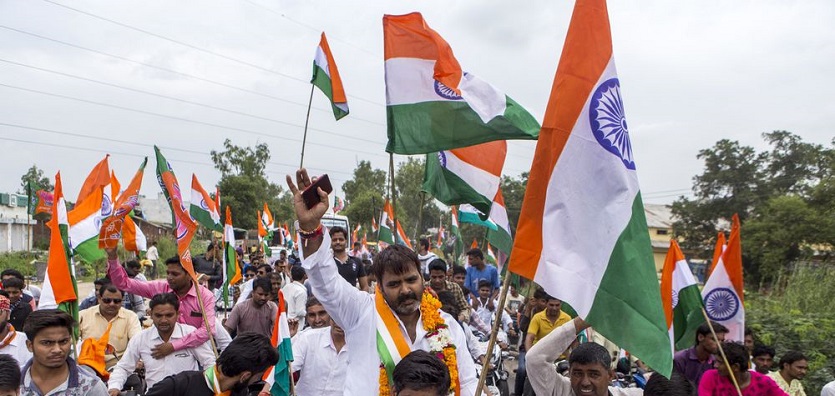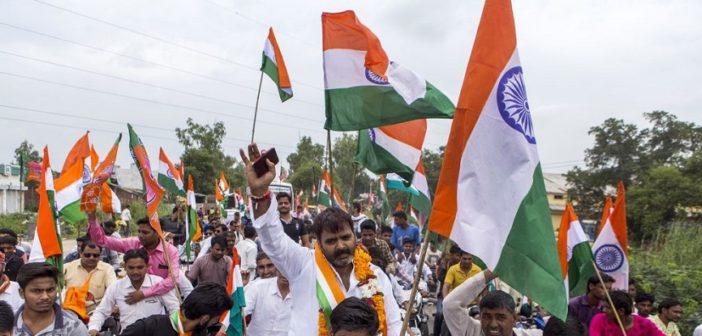
By Sarosh Bana, APSM Correspondent, Mumbai
Many Indians are bracing themselves for turbulence ahead as the Narendra Modi-led Bharatiya Janata Party (BJP) government pummelled its way to another five-year term on the back of the most hateful, divisive and bigoted electoral campaign the country has witnessed.
Thursday’s vote count for the 542-member Lower House of Parliament gave the BJP and its National Democratic Alliance (NDA) partners a smothering majority over the Indian National Congress and its allies from the previous United Progressive Alliance (UPA). The BJP, in fact, built up on its own crushing majority that it had secured in the last general election in 2014 when too the “Modi wave” had decimated the Congress from a national party with 206 seats to just another contender with 44, its lowest tally ever.
It is a quirk of Indian elections that brings back to power a dispensation whose excesses far outweighed whatever little good it did. What the Hindu nationalist party holds out for the next five years threatens to undermine democracy along similar lines.
Its leaders have already sounded out their resolve to unseat the Congress from Madhya Pradesh and Karnataka. Even as the results were indicating a Congress win in the recent Assembly polls in these two crucial states, the nation was aghast at seeing the party hustling its legislators into quarantine to prevent them from being poached upon by the BJP. The BJP has shown its intent to override poll results by engineering defections by Opposition legislators, as in 2017, when it had supplanted Congress-led governments in the states of Goa and Manipur.
A communal conflagration is also feared if the BJP acts on its pledge to construct a temple to Lord Ram at a disputed site at the Hindu god’s birthplace of Ayodhya in north India. The Ayodhya issue is pending before courts, a result of the 1992 razing of an ancient mosque that ignited communal clashes across the country that massacred over 2,000 people.
Another deeply emotive issue is the BJP’s proposal to repeal Article 370 of the Constitution that confers autonomous status to Jammu and Kashmir (J&K), as also Article 35A that provides special rights and privileges to the permanent residents of this strife-ridden northern border state. Separatism, and terrorism, grew so much under BJP rule in this state that the party was forced to step down last June and bring J&K under President’s rule.
Yet another polarising issue is the BJP’s pledge to deport all Muslims not recognised as citizens by the National Register of Citizens now under preparation. The Register has determined four million people to be illegal immigrants, mostly Muslims from Bangladesh. The exercise is, however, widely perceived to be biased against this minority community as it largely does not vote for the BJP.
The BJP’s strident politics of hate and fear had exercised the Indian public and media as rarely before, compounded by the fact that the party’s promise to cleanse the system did not address its own turf. A quarter of the party’s candidates in this election were estimated by the Association for Democratic Reforms to be facing serious charges, such as of crimes against women and of murder, attempt to murder, kidnapping, and hate speech. They included a woman Hindu prelate candidate who was on trial for terrorism related to a 2008 bomb blast case that had slain six people and injured over a hundred.
The BJP’s victory has been caused as much by a moribund Opposition and its dispirited campaign as it was the result of the Modi brigade’s own robust canvassing, communal polarisation of the electorate, cavalier vote rigging and co-opting to its ranks most national institutions, including the Election Commission, by divesting them of their autonomy and neutrality through handpicked leadership.
Seldom had Indian voters such a Hobson’s choice as in this election. On one side was the UPA that had demeaned and short-changed the nation by its staggering corruption scandals – worth upwards of $65 billion – over its two-term rule from 2004 to 2014.
And on the other was, simply, Modi, where the Prime Minister was contrived into an invincible supreme leader who was pitched as the talisman that would bludgeon the opposition into oblivion. The scion of the Congress’s ruling family and its possible Prime Minister-designate, the 48-year-old Rahul Gandhi, for instance, could scarcely measure up as a credible alternative.
Modi had swept into power in 2014 by catching a short-changed public’s imagination with his populist promises of transforming life and livelihoods. Most promises were belied, leading to the Prime Minister’s widespread lampooning on social media as feku (fibber), to the extent that a Google search of “Feku no. 1” yields links to him. Yet his popularity cruised high at 43 per cent, as his charisma and oratory boosted his aura above an Opposition splintered by divergent objectives and prime ministerial aspirations.
Whether the Congress’s defeat ultimately translates into a “Congress-free India” aspired by Modi and his close associate and party president Amit Shah will depend on the fallen party’s ability, and will, to revive itself. Shah has besides famously said that because of its performance, no one would be able to dethrone the BJP for the next 50 years.
One hoped that by “performance”, Shah did not mean the BJP’s mission of beti bachao, beti padhao (protect your daughter, educate your daughter) when the country was shamed by 167,900 rapes during its five-year rule, the rampant torture and rapes of young girls in children’s homes often run by BJP affiliates, and the agrarian distress that caused 36,332 farmers to commit suicides between 2014 and 2016 (there are no official figures for the last two years), even as all these instances are severely under-reported.
And while the BJP had, in 2014, promised to create 20 million jobs annually, there has been an unprecedented shrinkage of employment opportunities of late, with 11 million losing their jobs in the last one year alone. Even a handful of job openings for unskilled labour attracts overwhelming numbers of applicants, including university graduates.
The nation appears to be checkmated by a toxic blend of personality politics and robust nationalism.






